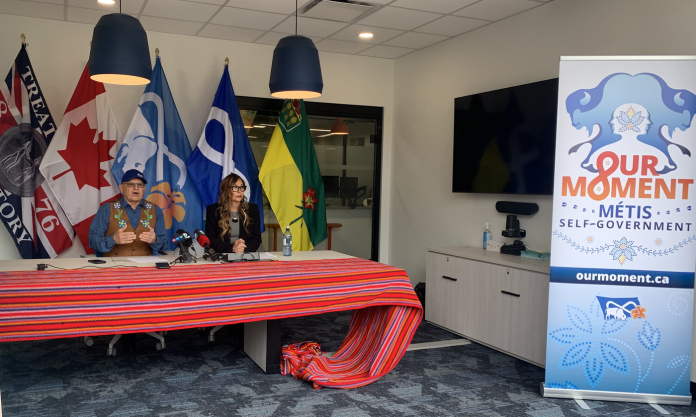
NC Raine
Local Journalism Initiative Reporter
Eagle Feather News
The Métis Nation-Saskatchewan (MN-S) has taken a major step in pursuit of self-government.
A new treaty document, called the ‘Kischi mashinahikan ooschi Michif’ – meaning ‘the sacred document of the Michif’, was announced by the MN-S on May 27 in Saskatoon.
The new modern treaty is a self-government agreement being negotiated with Canada and will constitutionally protect the right of self-government of the Métis in Saskatchewan. The treaty will ensure Métis people have jurisdiction over their core governance matters, and cannot be overruled by the federal government.
“Our nation has been fighting for Kischi mashinahikan ooschi Michif for 150 years,” said MN-S President Glen McCallum. “Today, we are one very important step closer to fully realizing our inherent right to self government.”
The new treaty comes just a month after the MN-S’ withdrawal from Bill C-53, a federal act respecting the recognition of certain Métis governments in Saskatchewan, Alberta, and Ontario.
The MN-S is pursuing its own agreement.
“The one size fits all approach proposed by the federal government was fundamentally flawed,” said McCallum.
Over the next several months, the MN-S will call on its citizens to discuss and shape the document. Discussions will be led by the Provincial Métis council.
The MN-S is planning to bring it to Parliament Hill in 2025.
“This is our moment as a community,” said Michelle LeClair, MN-S Vice-President. “This is our moment for our citizens. This is our moment for our children and grandchildren and future grandchildren. This document will live forever in time.”
The most important components of the document are the self-government agreements, said LeClair, which she hopes will restore lost culture and identity.
“Across this country, Métis children were taken from their homes,” said LeClair. “They lost that connectedness to the values, culture, and language. So this is a very important thing for us.”
To ratify the Treaty 75 per cent of MN-S citizens must vote yes. To help keep citizens informed the MN-S has launched a website where people can find answers to frequently asked questions.
“This is 150 years in the making,” said LeClair. “We know where we want to go. This is our time to do it our way, to do in a way that reflects who we are as people.”
